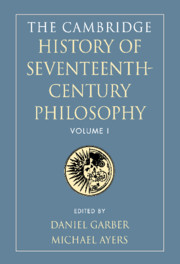Book contents
- Frontmatter
- Introduction
- I The context of seventeenth-century philosophy
- II Logic, language, and abstract objects
- III God
- IV Body and the physical world
- 15 The scholastic background
- 16 The occultist tradition and its critics
- 17 Doctrines of explanation in late scholasticism and in the mechanical philosophy
- 18 New doctrines of body and its powers, place, and space
- 19 Knowledge of the existence of body
- 20 New doctrines of motion
- 21 Laws of nature
- 22 The mathematical realm of nature
- V Spirit
- Bibliographical appendix
- Bibliography
- References
19 - Knowledge of the existence of body
from IV - Body and the physical world
Published online by Cambridge University Press: 28 March 2008
- Frontmatter
- Introduction
- I The context of seventeenth-century philosophy
- II Logic, language, and abstract objects
- III God
- IV Body and the physical world
- 15 The scholastic background
- 16 The occultist tradition and its critics
- 17 Doctrines of explanation in late scholasticism and in the mechanical philosophy
- 18 New doctrines of body and its powers, place, and space
- 19 Knowledge of the existence of body
- 20 New doctrines of motion
- 21 Laws of nature
- 22 The mathematical realm of nature
- V Spirit
- Bibliographical appendix
- Bibliography
- References
Summary
Can we know whether or not there is a material world? Before Descartes, this question was rarely asked. A few thinkers in antiquity were reported to have expressed sweeping doubts about the existence of things. For instance, Sextus Empiricus tells us that Gorgias of Leontini defended the threefold claim that nothing exists; that even if something existed, we could not understand it; and that even if we could understand it, we could not communicate that understanding to anyone else. Zeno of Elea is alleged, by Seneca, to have asserted that nothing exists. And Metrodorus of Chios, according to Cicero, thought we cannot know whether anything exists. But expressions of such world-annihilating doubt were rare, their interpretation is debatable, and they provoked no sustained debate about whether we can know that bodies exist. It was far more common for the ancient sceptics to argue that we cannot get beyond the appearances of bodies, to discover their true nature, than to raise doubts about their existence. Thus Sextus, in a well-known passage, said we must grant that honey appears sweet to us, but we cannot determine whether honey in itself is sweet; but Sextus did not suggest that, apart from the appearance, there may be no honey at all.
A few mediaeval thinkers do seem to have voiced doubts about the existence of the bodies our senses perceive. al-Ghazali, for example, held that we cannot be certain that, at death, we will not find this life to have been a dream and the things we seem to have perceived in it but ‘empty imaginings’. And Nicolaus of Autrecourt said that if it is granted that God can cause our sense perceptions, then we cannot be sure that bodies exist, for we cannot be sure that God Himself is not causing our perceptions.
- Type
- Chapter
- Information
- The Cambridge History of Seventeenth-Century Philosophy , pp. 624 - 648Publisher: Cambridge University PressPrint publication year: 2000

